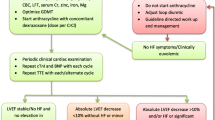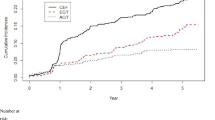Abstract
Background and objective
Anthracyclines are highly effective and widely used cytotoxic agents, but their application is often limited by cumulative dose-dependent cardiotoxicity. Dexrazoxane has been shown in several clinical trials to prevent the development of this serious toxicity. The aim of our study was to analyze the incidence of cardiac dysfunction over a 10-year period in patients with breast cancer who were treated with anthracycline-based regimens with addition of dexrazoxane, mainly in an adjuvant setting.
Methods
We conducted a retrospective analysis on a population of women with breast cancer treated at our institution between January 1993 and October 2003. We reviewed patients’ medical records and data on patient characteristics, treatment history, and adverse events that were collected, starting from the time of first visit before starting therapy, with the use of software created and designed for clinical records management in our institution (1999 OK-DH™). Patients underwent an ECG assessment prior to starting chemotherapy, and were clinically monitored for cardiac failure. Those who developed signs and symptoms suggestive of cardiac dysfunction underwent further ECG. If clinical findings indicated, echocardiography and further cardiologic investigations were performed. The main outcome measure was the development of signs and symptoms indicative of congestive heart failure (CHF).
Results
A total of 318 female patients were treated with an anthracycline (doxorubicin or epirubicin)-based combination chemotherapy regimen during this time, in most cases in the adjuvant setting (n = 285). Most patients (n = 302) had early-stage disease and only 16 women presented with metastatic disease with good life expectancy (at least 1 year). All patients received dexrazoxane 1000 mg/m2 intravenously prior to anthracycline administration during each chemotherapy cycle. The median follow-up duration was 35 months. During this time, five patients (1.57%) developed signs and symptoms of CHF. No patient at our institution died of heart failure during the period analyzed. Dexrazoxane was well tolerated, with no reports of adverse events associated with this drug.
Conclusions
The reported incidence of cardiotoxicity in this study represents a marked reduction compared with historical data for patients receiving anthracycline-based chemotherapy without dexrazoxane. Dexrazoxane appears to have a cardioprotective effect in women with early-stage or advanced breast cancer treated with anthracycline-based combination chemotherapy, mainly as an adjuvant treatment. Prospective, randomized, controlled clinical trials in adjuvant setting should be performed to confirm these results.




Similar content being viewed by others
References
Muggia FM, Green MD. New anthracycline antitumor antibiotics. Crit Rev Oncol Hematol 1991; 11(1): 43–64.
Swain SM, Whaley FS, Ewer MS. Congestive heart failure in patients treated with doxorubicin: a retrospective analysis of three trials. Cancer 2003; 97(11): 2869–79.
Michelotti A, Venturini M, Tibaldi C, et al. Single agent epirubicin as first line chemotherapy for metastatic breast cancer patients. Breast Cancer Res Treat 2000; 59(2): 133–9.
Baldini E, Prochilo T, Salvadori B, et al. Multicenter randomized phase III trial of epirubicin plus paclitaxel vs epirubicin followed by paclitaxel in metastatic breast cancer patients: focus on cardiac safety. Br J Cancer 2004; 91(1): 45–9.
Dresdale A, Bonow RO, Wesley R, et al. Prospective evaluation of doxorubicin-induced cardiomyopathy resulting from postsurgical adjuvant treatment of patients with soft tissue sarcomas. Cancer 1983; 52(1): 51–60.
Bristow MR, Thompson PD, Martin RP, et al. Early anthracycline cardiotoxicity. Am J Med 1978; 65(5): 823–32.
Billingham ME, Bristow MR, Glatstein E, et al. Adriamycin cardiotoxicity: endomyocardial biopsy evidence of enhancement by irradiation. Am J Surg Pathol 1977; 1(1): 17–23.
Steinherz LJ, Steinherz PG, Tan CT, et al. Cardiac toxicity 4 to 20 years after completing anthracycline therapy. JAMA 1991; 266(12): 1672–7.
Kremer LC, van der Pal HJ, Offringa M, et al. Frequency and risk factors of subclinical cardiotoxicity after anthracycline therapy in children: a systematic review. Ann Oncol 2002; 13(6): 819–29.
Von Hoff DD, Layard MW, Basa P, et al. Risk factors for doxorubicin-induced congestive heart failure. Ann Intern Med 1979; 91(5): 710–7.
Weiss AJ, Metter GE, Fletcher WS, et al. Studies on adriamycin using a weekly regimen demonstrating its clinical effectiveness and lack of cardiac toxicity. Cancer Treat Rep 1976; 60(7): 813–22.
Hortobagyi GN, Frye D, Buzdar AU, et al. Decreased cardiac toxicity of doxorubicin administered by continuous intravenous infusion in combination chemotherapy for metastatic breast carcinoma. Cancer 1989; 63(1): 37–45.
Jain KK, Casper ES, Geller NL, et al. A prospective randomized comparison of epirubicin and doxorubicin in patients with advanced breast cancer. J Clin Oncol 1985; 3(6): 818–26.
Sells RA, Gilmore IT, Owen RR, et al. Reduction in doxorubicin toxicity following liposomal delivery. Cancer Treat Rev 1987; 14 (3–4): 383–7.
Venturini M, Michelotti A, Del Mastro L, et al. Multicenter randomized controlled clinical trial to evaluate cardioprotection of dexrazoxane versus no cardioprotection in women receiving epirubicin chemotherapy for advanced breast cancer. J Clin Oncol 1996; 14(12): 3112–20.
Ryberg M, Nielsen D, Skovsgaard T, et al. Epirubicin cardiotoxicity: an analysis of 469 patients with metastatic breast cancer. J Clin Oncol 1998; 16(11): 3502–8.
Dardir M, Herman EH, Ferrans VJ. Effects of ICRF-187 on the cardiac and renal toxicity of epirubicin in spontaneously hypertensive rats. Cancer Chemother Pharmacol 1989; 23(5): 269–75.
Myers CE, McGuire WP, Liss RH, et al. Adriamycin: the role of lipid peroxidation in cardiac toxicity and tumor response. Science 1977; 197(4299): 165–7.
Zhang J, Herman EH, Ferrans VJ. Dendritic cells in the hearts of spontaneously hypertensive rats treated with doxorubicin with or without ICRF-187. Am J Pathol 1993; 142(6): 1916–26.
Herman EH, Ferrans VJ. Examination of the potential long-lasting protective effect of ICRF-187 against anthracycline-induced chronic cardiomyopathy. Cancer Treat Rev 1990; 17 (2–3): 155–60.
Doroshow JH. Anthracycline antibiotic-stimulated Superoxide, hydrogen peroxide, and hydroxyl radical production by NADH dehydrogenase. Cancer Res 1983; 43(10): 4543–51.
Doroshow JH, Locker GY, Baldinger J, et al. The effect of doxorubicin on hepatic and cardiac glutathione. Res Commun Chem Pathol Pharmacol 1979; 26(2): 285–95.
Doroshow JH, Locker GY, Myers CE. Enzymatic defences of the mouse heart against reactive oxygen metabolites. J Clin Invest 1980; 65: 128–35.
Sobol MM, Amiet RG, Green MD. In vitro evidence for direct complexation of ADR-529/ICRF-187 [(+)-1,2-bis-(3,5-dioxo-piperazin-1-yl)propane] onto an existing ferric-anthracycline complex. Mol Pharmacol 1992; 41(1): 8–17.
Hasinoff BB. The interaction of the cardioprotective agent ICRF-187 (+)-1,2-bis(3,5-dioxopiperazinyl-1-yL)propane); its hydrolysis product (ICRF-198); and other chelating agents with the Fe(III) and Cu(II) complexes of adriamycin. Agents Actions 1989; 26 (3–4): 378–85.
Creighton AM, Hellmann K, Whitecross S. Antitumour activity in a series of bisdiketopiperazines. Nature 1969; 222(5191): 384–5.
Woodman RJ, Cysyk RL, Kline I, et al. Enhancement of the effectiveness of daunorubicin (NSC-82151) or adriamycin (NSC-123127) against early mouse L1210 leukemia with ICRF-159 (NSC-129943). Cancer Chemother Rep 1975; 59(4): 689–95.
Swain SM, Vici P. The current and future role of dexrazoxane as a cardioprotectant in anthracycline treatment: expert panel review. J Cancer Res Clin Oncol 2004; 130(1): 1–7.
Swain SM, Whaley FS, Gerber MC, et al. Delayed administration of dexrazoxane provides cardioprotection for patients with advanced breast cancer treated with doxorubicin-containing therapy. J Clin Oncol 1997; 15(4): 1333–40.
Wexler LH, Andrich MP, Venzon D, et al. Randomized trial of the cardioprotective agent ICRF-187 in pediatric sarcoma patients treated with doxorubicin. J Clin Oncol 1996; 14(2): 362–72.
Lopez M, Vici P, Di Lauro K, et al. Randomized prospective clinical trial of high-dose epirubicin and dexrazoxane in patients with advanced breast cancer and soft tissue sarcomas. J Clin Oncol 1998; 16(1): 86–92.
Swain SM, Whaley FS, Gerber MC, et al. Cardioprotection with dexrazoxane for doxorubicin-containing therapy in advanced breast cancer. J Clin Oncol 1997; 15(4): 1318–32.
Speyer JL, Green MD, Zeleniuch-Jacquotte A, et al. ICRF-187 permits longer treatment with doxorubicin in women with breast cancer. J Clin Oncol 1992; 10(1): 117–27.
ten Bokkel Huinink WW, Schreuder JE, Dubbleman R, et al. ICFF-187 protects against doxorubicin induced cardiomyopathy [abstract]. Ann Oncol 1992; 3 (Suppl. 3): 114.
Sparano JA, Speyer J, Gradishar WJ, et al. Phase I trial of escalating doses of paclitaxel plus doxorubicin and dexrazoxane in patients with advanced breast cancer. J Clin Oncol 1999; 17(3): 880–6.
Tetef ML, Synold TW, Chow W, et al. Phase I trial of 96-hour continuous infusion of dexrazoxane in patients with advanced malignancies. Clin Cancer Res 2001; 7(6): 1569–76.
Fleming ID, Cooper JS, Henson DE, et al. AJCC cancer staging manual. In: 5th ed. Philadelphia (PA): Lippincott-Raven, 1997.
Erhart RH, Tutsch KD, Koeller JM, et al. Pharmacokinetics of ICRF-187 intravenous infusion in adult cancer patients. Cancer Res 1982; 42: 5255–61.
Sparano JA. Use of dexrazoxane and other strategies to prevent cardiomyopathy associated with doxorubicin-taxane combinations. Semin Oncol 1998; 25(4 Suppl. 10): 66–71.
Acknowledgment
Editorial support for the preparation of this manuscript was provided by Wolters Kluwer Health Medical Communications. The authors have no conflicts of interest that are relevant to the content of this study.
Author information
Authors and Affiliations
Corresponding author
Rights and permissions
About this article
Cite this article
Testore, F., Milanese, S., Ceste, M. et al. Cardioprotective Effect of Dexrazoxane in Patients with Breast Cancer Treated with Anthracyclines in Adjuvant Setting. Am J Cardiovasc Drugs 8, 257–263 (2008). https://doi.org/10.2165/00129784-200808040-00005
Published:
Issue Date:
DOI: https://doi.org/10.2165/00129784-200808040-00005




